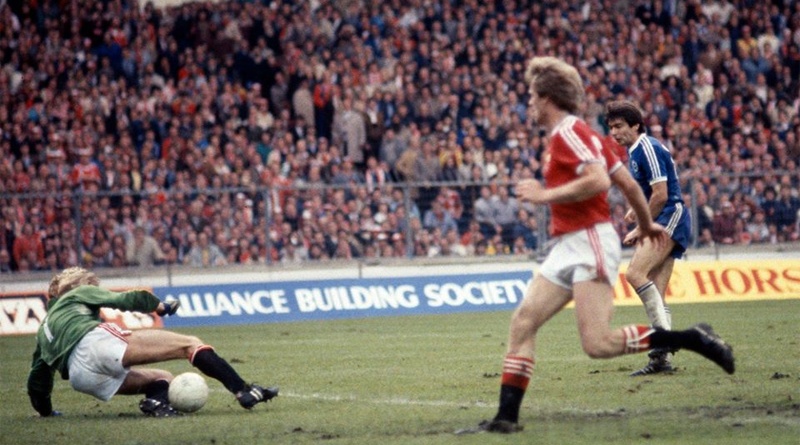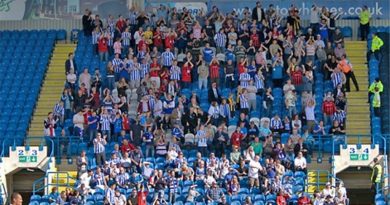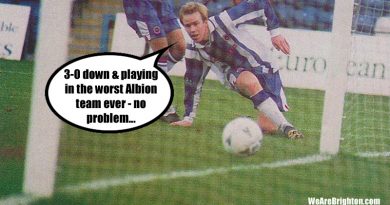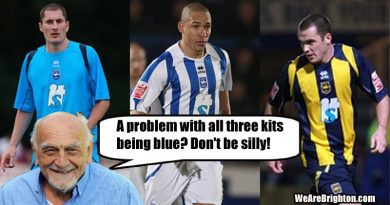What if Smith HAD scored for Brighton in the 1983 FA Cup Final?
The 119th minute of the 1983 FA Cup Final is arguably the most famous moment in Brighton & Hove Albion history. Books have been written about it, fanzines named after it and it gave the world’s greatest cup competitions one of its greatest quotes.
Michael Robinson skipped past Manchester United defender Gordon McQueen and squared to Gordon Smith. With the game tied at 2-2 and seconds remaining of extra time, Smith just had to beat Gary Bailey in the United goal to win it for Brighton.
It would have been the biggest shock in FA Cup final history. “And Smith must score” declared commentator Peter Jones…
But Smith did not score. He only succeeded in shooting against the legs of Bailey, with the grateful United goalkeeper diving on the loose ball before anyone in blue could gobble up the rebound.
The full time whistle blew and the Albion’s chance of unparalleled glory was gone. They would go onto be hammered 4-0 in a replay five days later.
Smith’s miss – or in reality, Bailey’s excellent save – has become one of football’s great “What if” moments. What if Smith HAD scored and Tony Grealish found himself climbing the 39 steps to Wembley’s Royal Box to collect the trophy?
How different would Brighton’s history post-May 1983 look? After all, a pretty dramatic decline followed those two games under the Twin Towers – 14 years later, the Albion finished 91st out of 92 teams in the Football League and were homeless.
United in contrast were celebrating their fourth Premier League title in five seasons. Two years later, they would become the only English side in history to win the League, FA Cup and European Cup treble.
Now, nobody is saying that it would have been the Albion being crowned Champions League winners in Camp Nou against Bayern Munich in 1999 if Smith had scored. But here is how history might have differed if Brighton had won the 1983 FA Cup Final.
Brighton would have been history makers
One thing that we can say with certainty if Smith had scored is that Brighton would have been history makers. No side had ever won the FA Cup in the same season as being relegated from the top flight.
The Albion had of course gone down in some style, rock bottom of Division One and eight points adrift of safety.
Wigan Athletic became the first – and so far only – club to achieve the feat when they upset Manchester City in the 2013 FA Cup Final.
There is a cautionary tale in the experiences of Wigan for those who think winning the FA Cup might have provided a springboard for Brighton to bounce back to the top flight.
Within two years of shocking City, the Latics did manage to get out of the Championship – but it was via the back door. They have been bouncing between League One and the second tier ever since, at one point almost going out of business due to unscrupulous owners and financial issues.
Sounds familiar doesn’t it? When Latcis fans were on the verge of losing their club, that heady day at Wembley was nothing but a glorious, hazy memory.
Brighton would have played European football
Playing European football is a genuine dream for supporters of a club like Brighton. It is why there is such excitement that Roberto De Zerbi has the Albion on the cusp of a top seven finish.
Had Smith scored and Brighton won the 1983 FA Cup Final, then the Albion would have qualified for the European Cup Winners’ Cup. Their first round opponents? Dukla Prague of Czechoslovakia.
Dukla would have visited the Goldstone Ground on Wednesday 14th September 1983. The Albion would have travelled to the wonderful Juliska Stadium 13 days later.
United saw off Dukla on away goals after a 1-1 draw in the first leg at Old Trafford and a 2-2 draw in the second leg in Prague.
Had Brighton done similar, then it would have been Spartak Varna of Bulgaria in round two, a small team called Barcelona in the quarter finals, Juventus in the semis and Porto in the final.
Not a bad little European tour.
Jimmy Melia might have kept his job
Within five months of Brighton appearing in the FA Cup Final, manager Jimmy Melia was handing his resignation to chairman Mike Bamber in a departure that made Gus Poyet’s 30 years later look like a walk in the park.
Bamber had appointed former Brighton defender Chris Cattlin as chief coach following the day out at Wembley, foisting a new member of staff on Melia who was enjoying his summer holidays when he found out the news.
Melia was told that he and Cattlin were to liaise on team matters and tactics. It later transpired that Cattlin was picking the side despite Bamber publicly reaffirming that Melia was the manager.
The situation came to a head when Cattlin’s selections were hammered 5-0 away at Grimsby Town on Saturday 15th October 1983. Melia handed in his resignation four days later and the issue spewed into an unseemly public spat.
Melia laid into Cattlin in the press; Bamber responded by saying that Melia had become a mole for a group looking to wrestle control of the club from the chairman.
With Cattlin now in charge officially, Melia decided to make an appearance in the North Stand for his successor’s first game at the helm against Sheffield Wednesday.
Wednesday won 3-1 and the bald head of Melia was seen bobbing around in the crowd as he was carried on the shoulders of supporters chanting “Melia in, Bamber out.” It was a farcical way for Melia to say goodbye.
Had Smith scored and Brighton won the Cup, then Melia’s stock would have been high enough for Bamber not to dare undermining his manager by making his own appointments to the coaching team.
Melia may have remained in charge for longer than the 10 months he managed. He would no doubt have added to his record of just seven league victories, which is one of the worst of any boss in Albion history.
Brighton’s FA Cup Final manager remaining in charge may not have been a good thing in the long run, however. Cattlin settled into his new role, leading the Albion to a ninth placed finish in the 1983-84 season. They were then just two points off a Division One return in 1984-85.
Mike Bamber, the attempted takeover and the ‘FA Cup Money’
If Smith had scored in the final and the FA Cup found its way into the Goldstone trophy cabinet, then the events that eventually led to Mike Bamber’s resignation as Albion chairman after 13 years of unprecedented success may have taken a different turn.
The turmoil started in the early part of the 1983-84 season. Music mogul Jeffrey Kruger was responsible for organising British and European tours by many successful American performers including Gladys Knight, Marvin Gaye, Barry White and promoting Johnny Cash. He also opened the famous Flamingo Club in Soho.
Along with son Howard, Kruger wanted to oust Bamber as chairman and take over the club. His campaign slogan was “Brighton FC, not Bamber FC” and among the questions he wanted answered were where was the redeveloped Goldstone North Stand that Bamber had long promised and what had happened to the FA Cup money? That is another quote that has entered Albion folklore.
Kruger billed his takeover as ‘Stop the Rot’ and claimed that he had significant financial backing from the United States. Bamber and the board rejected Kruger’s approaches out of hand and the takeover talk fizzled out as the drama between Melia and the Albion took centre stage.
Bamber was eventually forced out 10 months later, although it had nothing to do with Kruger. The Albion chairman suffered a heart attack in March as a season of turmoil came to a close and with supporters and directors feeling that a fresh approach was needed, he resigned in July 1984 citing “major disagreements on policy.”
Had Brighton beaten Manchester United at Wembley, perhaps a less stressful 1983-83 season would have resulted in Bamber staying.
Who knows where Brighton’s line of chairmanship would have ended up – it was only seven years after Bamber’s departure that Greg Stanley assumed control and we all know where that led.
And we still don’t know what happened to the FA Cup money – as the fact it is asked at least once a month on North Stand Chat is testament to.
Bill Archer, David Bellotti and Greg Stanley
Everything we have discussed so far would have happened within a year of Brighton losing in the FA Cup Final to Manchester United. Realistically, the Albion’s longer term history might not have changed, even with victory at Wembley.
The club were losing significant amounts of money, even in the top flight. If you are one of those people who loves talking about average attendances and how well supported the Albion are, then look away now.
In the FA Cup Final season, Goldstone attendances averaged just 14,676 in the top flight. By 1990-91, they were down to 8,010 – and that was to watch a Brighton side who qualified for the play offs by finishing in the top six in the second tier.
The likelihood is that winning the Cup would not have done much to turn around the Sussex footballing public’s apathy towards going along to the Goldstone and watching the Albion.
It would not have improved the dire financial situation that eventually presented a Lancashire businessman with the opportunity to buy the Albion for £56.25 – or three bags of Amex Stadium-priced Starbust in modern day money – either.
The sale of the Goldstone, the Gillingham years, Withdean and the battle for Falmer all would have still taken place.
And instead of being the FA Cup finalists who went onto lose to non league sides like Kingstonian, Sudbury Town, Hereford United and Lincoln City in the competition, Brighton would have been the FA Cup winners embarrassed by London cabbies and Essex postmen.
And what about Manchester United?
Oh yes, we are going there. Had United been humbled by little old Brighton in the FA Cup Final, Big Ron Atkinson might have found himself being handed his P45 by the powers that be at Old Trafford.
Atkinson losing his job in the summer of 1983 could have dramatically altered the history of Manchester United.
Winning the FA Cup meant that Big Ron stayed in post until November 1986, when he was replaced by Aberdeen manager Alex Ferguson.
Had Atkinson been sacked prior to that date, then maybe the Red Devils do not turn to Ferguson and United do not spend the next 27 years re-writing the record books.
Of course, this is all pure speculation. There are only two things we can say with certainty would have happened had Smith scored.
The name Brighton & Hove Albion would have been engraved on the FA Cup forever. And Dukla Prague away would have happened…. can you imagine?




